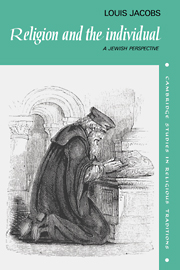Book contents
- Frontmatter
- Contents
- Preface
- List of abbreviations
- 1 Individual significance
- 2 Self-realization as a religious value
- 3 Attitudes to life and death
- 4 Family relationships
- 5 Loving the neighbour
- 6 Communal obligations
- 7 God and the soul
- 8 Does a person's body belong to God?
- 9 Worship with the body
- 10 God and personal freedom
- 11 Immortality
- 12 Conclusion: A question of emphasis
- Glossary
- Notes
- Bibliography
- Index
2 - Self-realization as a religious value
Published online by Cambridge University Press: 11 October 2009
- Frontmatter
- Contents
- Preface
- List of abbreviations
- 1 Individual significance
- 2 Self-realization as a religious value
- 3 Attitudes to life and death
- 4 Family relationships
- 5 Loving the neighbour
- 6 Communal obligations
- 7 God and the soul
- 8 Does a person's body belong to God?
- 9 Worship with the body
- 10 God and personal freedom
- 11 Immortality
- 12 Conclusion: A question of emphasis
- Glossary
- Notes
- Bibliography
- Index
Summary
The statement in the Mishnah, quoted in the previous chapter, that it is necessary for a man to say, ‘For my sake was the world created’, is not, of course, an invitation to megalomania. Unbridled self-esteem and self-centredness is as stultifying as complete disregard for one's own interests. The famous maxim attributed to Hillel (Avot i: 14) is pertinent: ‘If I am not for myself who is for me? But if I am only for myself what am I?’, as is the saying of the blind Hasidic master R Simhan Bunem of Psycha. This teacher observed that a man should have two pockets, in each of which he places a slip of paper. On one slip he should inscribe the words of the Mishnah, ‘For my sake was the world created’, on the other the plea of Abraham, ‘I am but dust and ashes’ (Genesis 18:27). When a man begins to doubt his worth, when he sees himself surrendering to despair, he should take out the slip reminding him that the whole world was created for his sake. But when he is at risk of thinking too much of himself he should read the inscription on the other slip as a reminder that even an Abraham thought of himself as but dust and ashes in the eyes of the Almighty.
In the same vein this Hasidic master used to say that he often entertained the notion, how good it would be if he could change places with Abraham. He would be Abraham, no less, and Abraham would be ‘the blind Bunem’. But then, he reflected, how would such an exchange benefit the Almighty?
- Type
- Chapter
- Information
- Religion and the IndividualA Jewish Perspective, pp. 10 - 14Publisher: Cambridge University PressPrint publication year: 1992



